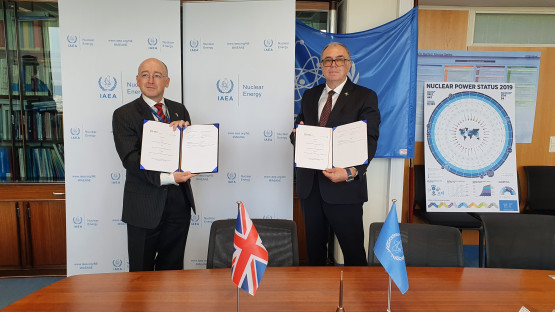Aiming to further promote innovations in advanced nuclear technologies worldwide, the IAEA has designated the UK National Nuclear Laboratory (UK-NNL) as a Collaborating Centre to support IAEA Member States in implementing programmatic activities in the field of advanced fuel and advanced fuel cycles. The agreement between the IAEA and the UK-NNL marks another step towards achieving deep decarbonisation of energy systems.
“IAEA Collaborating Centres are one of our key cooperation mechanisms, and I am very happy that UK-NNL is now part of this select group of institutions, especially to help the Department of Nuclear Energy in supporting Member States’ efforts in the areas of advanced nuclear fuel and related fuel cycles,” said Mikhail Chudakov, IAEA Deputy Director General and Head of the Department of Nuclear Energy. “Access to UK-NNL’s infrastructure and expertise will be an invaluable opportunity to support the development and implementation of education and training courses in Member States, as well as learning and training materials on fuel cycle facilities and nuclear power reactor fuel.”
UK-NNL will be the first IAEA Collaborating Centre in the field of Advanced Fuel Cycles, addressing issues such as the recycling of nuclear fuel for advanced and innovative reactors. It will support the IAEA in developing and implementing activities of mutual interest aimed at ensuring the safe, efficient and sustainable development of nuclear energy through research and development, knowledge transfer, education and training.
“This partnership between the IAEA and the United Kingdom is a tangible manifestation of what the UK can contribute to the IAEA’s work,” said Ambassador David Hall, UK Resident Representative to IAEA and Member of the IAEA Board of Governors. “UK-NNL is recognised as one of the ‘crown jewels’ of the UK civil nuclear sector, and I am sure that the collaboration between UK-NNL and the IAEA will be very useful and beneficial. It will serve as the flagship of the United Kingdom’s contributions to the IAEA.”
The Collaborating Centre will be located at UK-NNL’s Preston site, in northwestern England, and will be equipped with nuclear physics and advanced reactor modelling capabilities. The Centre will also benefit from the research conducted by UK-NNL and their partners in developing advanced low-carbon nuclear technologies. “The Centre will build on an extensive body of work and capability which exists in the UK-NNL and across the UK, much of which has been enabled by the UK’s commitment to nuclear innovation via the Advanced Fuel Cycle Programme,” said Paul Howarth, UK-NNL’s Chief Executive Officer. “We are excited to build on this work as the Collaborating Centre progresses over the coming months and years.”
IAEA Collaborating Centres
To promote the practical use of nuclear technologies, the IAEA collaborates with the designated institutions around the world. Through the Collaborating Centres network, these organizations in Member States can assist the IAEA by undertaking original research and development and training relating to nuclear science, technologies and their safe and secure applications. With the newly designated UK-NNL Collaborating Centre, there are now 45 active Collaborating Centres worldwide, with ongoing discussions in several countries to establish new Centres.



